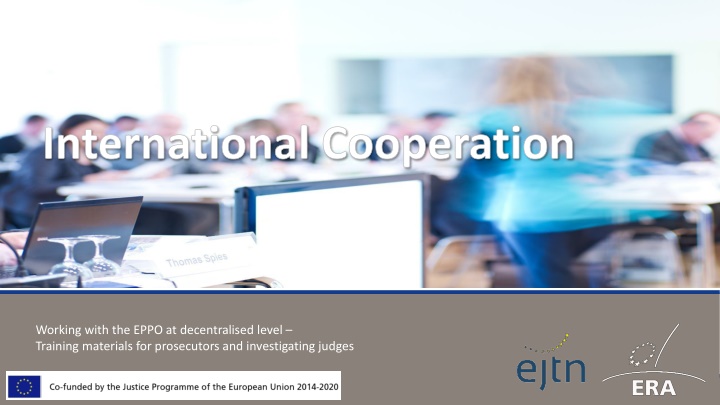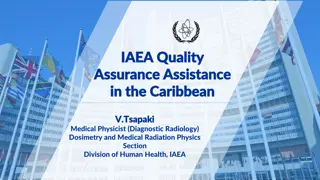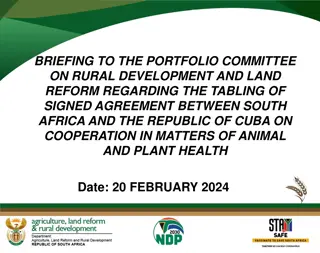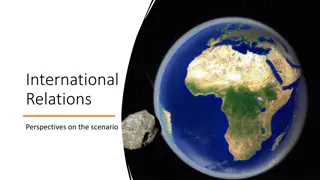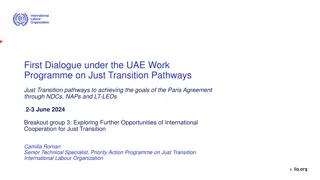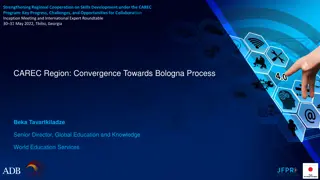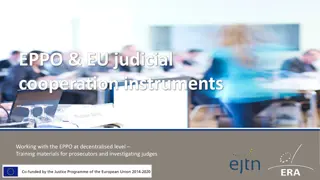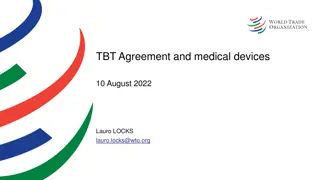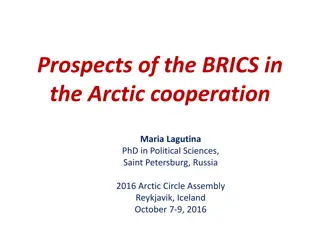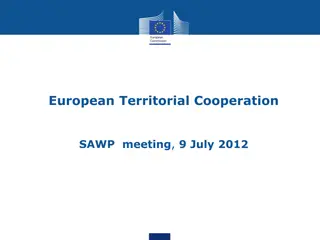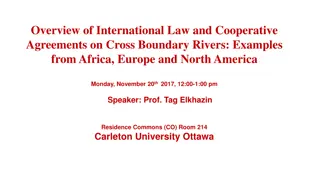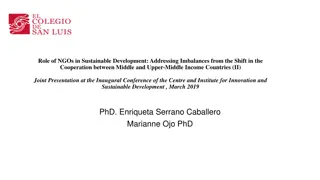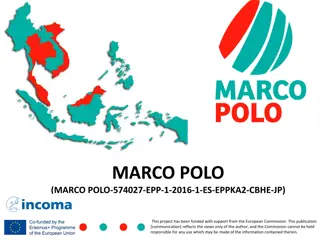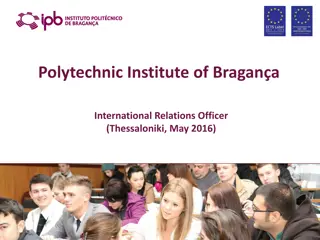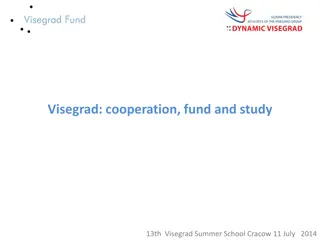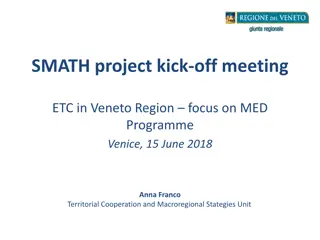International Cooperation
The content covers the International Cooperation Working with the EPPO, detailing provisions on relations with various entities like Eurojust, OLAF, Europol, and more. It also delves into rules and measures regarding cross-border investigations within participating Member States under the EPPO Regulation. The focus is on enhancing collaboration and legal processes for effective prosecution and investigation.
Download Presentation

Please find below an Image/Link to download the presentation.
The content on the website is provided AS IS for your information and personal use only. It may not be sold, licensed, or shared on other websites without obtaining consent from the author.If you encounter any issues during the download, it is possible that the publisher has removed the file from their server.
You are allowed to download the files provided on this website for personal or commercial use, subject to the condition that they are used lawfully. All files are the property of their respective owners.
The content on the website is provided AS IS for your information and personal use only. It may not be sold, licensed, or shared on other websites without obtaining consent from the author.
E N D
Presentation Transcript
International Cooperation Working with the EPPO at decentralised level Training materials for prosecutors and investigating judges 1
EPPO: International Cooperation Regulation (EU) 2017/1939 ( EPPO Regulation ) CHAPTER X PROVISIONS ON THE RELATIONS OF THE EPPO WITH ITS PARTNERS Art. 99: Common provisions Art. 100: Relations with Eurojust Art. 101: Relations with OLAF Art. 102: Relations with Europol Art. 103: Relations with other institutions, bodies, offices and agencies of the Union Art. 104: Relations with third countries and international organisations Art. 105: Relations with non-participating Member States 2
Relations with other institutions, bodies, offices and agencies of the Union Article 99 EPPO Regulation: (1): cooperative relations with institutions, bodies, offices or agencies of the Union; authorities of non-participating Member States; authorities of third countries and international organisations; (2): EPPO may directly exchange all information, but: unless otherwise provided for in this Regulation see Arts. 31 to 33 for intra-EPPO cooperation See Arts. 100 to 102 for relationship with major European Union Justice/Home Affairs partners see Art. 103 for other Union institutions/offices/agencies see Arts. 104 and 105 for real MLA /cooperation with third countries/international organisations (3): working arrangements, but: only of a technical and/or operational nature, no basis for exchange of personal data, nor legally binding effects on the Union or its Member States See Article 66 of the IRP Internal Rules of Procedure (Decision 003/2020 of the College) on the working arrangements. 3
EPPO: International Cooperation Regulation (EU) 2017/1939 ( EPPO Regulation ) CHAPTER V RULES OF PROCEDURE ON INVESTIGATIONS, INVESTIGATION MEASURES, PROSECUTION AND ALTERNATIVES TO PROSECUTION SECTION 2 Rules on investigation measures and other measures Art. 31: Cross-border investigations Art. 32: Enforcement of assigned measures Art. 33: Pre-trial arrest and cross-border surrender
Cross-border investigations among participating Member States Article 31 EPPO Regulation: (1): handling European Delegated Prosecutor decides on the adoption of necessary measure; assigns it to an assisting European Delegated Prosecutor located in the Member State where the measure needs to be carried out. (2): any measuresavailable to handling European Delegated Prosecutor in accordance with Article. 30 (3): in principle, only judicial authoritization in one Member State (4): assisting EDP undertakes the assigned measure, or instructs national authorities, see also Article 32 (5), (7), (8): no strict grounds of refusal, resolution mechanism within EPPO New system sui generis for intra-EPPO cooperation As a rule: legal instruments on mutual recognition or cross-border cooperation, e.g. European Investigaton Order or 2000 EU Convention on Mutual Assistance in Criminal Matters not applicable within participating Member States; Exception: (6): assigned measure does not exist in a purely domestic situation, but would be available in a cross-border situation covered by legal instruments on mutual recognition or cross-border cooperation
Cross-border investigations among participating Member States Article 31 EPPO Regulation: (6): if the assigned measure does not exist in a purely domestic situation, but would be available in a cross-border situation covered by legal instruments on mutual recognition or cross-border cooperation, the European Delegated Prosecutors concerned may, in agreement with the supervising European Prosecutors concerned, have recourse to such instruments. Examples: Directive 2014/41/EU of 3 April 2014 regarding the European Investigation Order in criminal matters Articles 22 and 23: Temporary transfer of persons held in custody for the purpose of carrying out an investigative measure Article 24: Hearing by videoconference or other audiovisual transmission Using the European Arrest Warrant is governed by Article 33 EPPO Regulation. In relation to non-participating Member States, EU instruments on mutual recognition or cross-border cooperation are applicable through the notification of EPPO as a competent authority, Article 105 EPPO Regulation.
Relations with Eurojust Article 100 EPPO Regulation: (1): mutual cooperation within their respective mandates; Art. 22 EPPO Regulation Arts. 2 to 5 Eurojust Regulation (2): EPPO may associate Eurojust in operational matters; sharing information, including personal data, on its investigations; in accordance with the relevant provisions of Regulation see Arts. 45, 46, 47(3), 53, 54 Eurojust may support in the transmission of EPPO decisions or requests for mutual legal assistance to, and execution in, non-participating Member States / third countries see Arts. 31 to 33 for intra-EPPO cooperation see Arts. 104 and 105 for cooperation with third countries/international organisations 7
Relations with Eurojust Article 100 EPPO Regulation: (3): indirect hit/no-hit access to information in each other s case management systems, i.e. information if a match has been found; see also Art. 50(5) Eurojust Regulation (4): EPPO may rely on the support and resources of the administration of Eurojust Eurojust may provide services of common interest to the EPPO Background: Art. 86(1) ( Council may establish a European Public Prosecutor's Office from Eurojust ) but: EPPO in Luxembourg, Eurojust in The Hague details: Arrangement between EPPO and Eurojust Art. 50(6) Eurojust Regulation, mirroring Art. 100(4) of EPPO Regulation 8
Relations with Eurojust Article 50 of Eurojust Regulation (EU) 2018/1727, in essence: (1): mirroring largely identical Art. 100(1) of EPPO Regulation (mutual cooperation within respective mandates) (2): Eurojust shall treat requests for support from the EPPO without undue delay, and, where appropriate, shall treat such requests as if from a national authority competent for judicial cooperation; (3): Eurojust shall make use of the Eurojust national coordination system, as well as relations established with third countries, including its liaison magistrates (4): in operational matters relevant to the EPPO s competences, Eurojust shall inform / associate EPPO sharing information on its cases, including personal data; but: requesting the EPPO to provide support 9
Relations with OLAF and EUROPOL Question: Which of the following authorities can an EDP task with undertaking investigatory measures for his/her case? a. b. c. d. National police OLAF Europol All of the above 10
Relations with OLAF and EUROPOL Question: Which of the following authorities can an EDP task with undertaking investigatory measures for his/her case? Correct answer: a. EDP work with the national investigation officers. a. National police - Art. 28(1) EPPO Regulation: Handling EPD may, in accordance with this Regulation and with national law, either undertake the investigation measures and other measures on his/her own or instruct the competent authorities in his/her Member State. Those authorities shall, in accordance with national law, ensure that all instructions are followed and undertake the measures assigned to them. the competent authorities in his/her Member State: can be police but also customs or tax investigation officers depending on national law b. supporting or complementing the EPPO s activity encompasses OLAF - see Art. 101 EPPO Regulation; OLAF does not carry out criminal investigations, but concededly unclear what c. Europol - see Art. 102 EPPO Regulation; Europol does not carry out criminal investigations, but concededly unclear what analytical support for EPPO encompasses 11
Relations with OLAF Article 101 EPPO Regulation: (1): mutual cooperation within their respective mandates; (2): no parallel OLAF administrative investigations into the same facts as underlying EPPO investigations; (3): EPPO may request OLAF, in accordance with OLAF s mandate, to support or complement the EPPO s activity (4): EPPO may provide relevant information to OLAF where the EPPO has decided not to conduct an investigation or has dismissed a case; purpose: enable administrative action by OLAF in accordance with its mandate; see Art. 39(4) EPPO Regulation , see also Art. 36(6) EPPO Regulation , no equivalent in Art. 40EPPO Regulation ? (5): indirect hit/no-hit access for EPPO to OLAF s case management system no specific EPPO provisions in OLAF Regulation (EU, Euratom) 883/2013 but 2018 COM Proposal (COM/2018/338 final) to amend OLAF Regulation in order to adapt to EPPO (currently in final stages of legislative procedure) 12
Relations with OLAF Article 101 EPPO Regulation : (3): EPPO may request OLAF, in accordance with OLAF s mandate, to support or complement the EPPO s activity see Art. 12e of COM Proposal (COM/2018/338 final) to amend OLAF Regulation (a) providing information, analyses (including forensic analyses), expertise and operational support (b): facilitating coordination competent national administrative authorities and bodies of the Union (c): administrative investigations but: no investigative operative support? in principle: EDP rely on national investigators; see Art. 28(1): handling EPD may, in accordance with this Regulation and with national law, either undertake the investigation measures and other measures on his/her own or instruct the competent authorities in his/her Member State. Those authorities shall, in accordance with national law, ensure that all instructions are followed and undertake the measures assigned to them. 13
Relations with Europol Article 102 EPPO Regulation : (1): working arrangement on cooperation modalities; (2): EPPO shall be able to obtain, at its request, any relevant information held by Europol, concerning any offence within EPPO s competence; EPPO may also ask Europol to provide analytical support to a specific investigation conducted by the EPPO analytical support, but: no investigative support? in principle: EDP rely on national investigators; see Art. 28(1): handling EPD may, in accordance with this Regulation and with national law, either undertake the investigation measures and other measures on his/her own or instruct the competent authorities in his/her Member State. Those authorities shall, in accordance with national law, ensure that all instructions are followed and undertake the measures assigned to them. no specific EPPO provisions in Europol Regulation (EU) 2016/794 14
Relations with other institutions, bodies, offices and agencies of the Union Article 103 EPPO Regulation: (1): cooperative relationship with the Commission; agreement setting out the modalities; but without prejudice to the proper conduct and confidentiality of its investigations (2): EPPO shall provide sufficient information in order to allow them to take appropriate measures (a) administrative/precautionary measures (b) intervention as a civil party in the proceedings (c) administrative recovery /disciplinary action for both (1) and (2): relevance of national law of Member State of EDP?, e.g, on general rules pf procedure and on confidentiality of criminal proceedings, or on standing of Union body/office/agency as party in criminal proceedings? 15
Relations with third countries and international organisations Question: What is the legal basis for an EDP to seek and receive assistance from the competent prosecutor in the United States of America? a. b. c. EPPO Regulation for EPPO, non-treaty based for US Bilateral treaty EPPO/US The Agreement on mutual legal assistance between the European Union and the United States of America of 2003 Only possible if bilateral treaty between the US and the Member State of the handling EDP exists, e.g. US/Italy 1982, US/Netherlands 1983, US/Spain 1992, US/France 1998, US/ Germany 2003 d. 16
Relations with third countries and international organisations Article 104 EPPO Regulation: (1): working arrangements referred to in Article 99(3); but these only cover exchange of strategic information and the secondment of liaison officers (2): EPPO may designate contact points in third countries; See Article 67 of the IRP on contact points. (3): international agreements on cooperation between Union and third countries? (see answer b.) (4): If no such specific (new) legal instrument: Recourse to multilateral international agreements? See answer c. - but will treaty parties/Member States/cooperating State recognise/notify EPPO as a competent authority? (5): recourse to powers of a national prosecutor from handling EDP s Member State to request legal assistance from authorities of third countries (treaty-based, non-treaty based) (6): EPPO may provide the competent authorities of third countries or international organisations with information or evidence which is already in the possession of the EPPO 17
Relations with third countries and international organisations Article 104 EPPO Regulation: (4): If no specific (new) legal instrument: (participating) Member States shall recognise EPPO as a competent authority for the purpose of multilateral international agreements on legal assistance in criminal matters, or their bilateral agreements shall notify EPPO as a competent authority for the purpose of multilateral international agreements on legal assistance in criminal matters, or their bilateral agreements if permitted under the relevant international agreement and subject to the third country s acceptance where necessary and possible, by way of an amendment to those agreements E.g.: Council of Europe Conventions, EU-US MLA Agreement, bilateral MLA agreements But: Possible under the legal framework of such instruments? Will third countries recognize EPPO? 18
Relations with third countries and international organisations Article 104 EPPO Regulation: (5): recourse to powers of a national prosecutor from handling EDP s Member State to request legal assistance from authorities of third countries (treaty-based, non-treaty based) on the basis of international agreements concluded by that Member State Do such agreements exist? or applicable national law What is the applicable national law? where required, through the competent national authorities Which are these national authorities? What are the formal requirements? What powers do the competent national authorities have over such EPPO requests? 19
Relations with third countries and international organisations Article 104 EPPO Regulation : (5): EPPO may request legal assistance in criminal matters from authorities of third countries in a particular case and within the limits of its material competence What if reciprocity is required? EPPO shall comply with the conditions which may be set by those authorities concerning the use of the information that they provided on that basis. Role of national judiciary? 20
Relations with third countries and international organisations Question: Can an EDP respond to the following assistance requests from the competent Swiss prosecutor in a Swiss corruption case? a. Transmit statements made by a witness that were taken by the EDP during EPPO investigations. 1. No. / 2. Yes, but only if Swiss case involves a PIF offence. / 3. Yes, and it does not need to involve a PIF offence. b. Hear a witness on the Swiss charges and take his/her statements. 1. No. / 2. Yes, but only if Swiss case involves a PIF offence. / 3. Yes, and it does not need to involve a PIF offence. c. Arrange to have suspect who is in provisional detention in an EPPO case temporarily transferred to Switzerland to question him/here there. 1. No. / 2. Yes, but only if Swiss case involves a PIF offence. / 3. Yes, and it does not need to involve a PIF offence. 21
Relations with third countries and international organisations Article 104 EPPO Regulation: (6): EPPO may provide the competent authorities of third countries or international organisations with information or evidence which is already in the possession of the EPPO No hearing of new witnesses - first alternative under b. would be correct Does not need to involve PIF crimes third alternative under a. would be correct What if reciprocity is required? After consulting the Permanent Chamber, handling EDP shall decide on any such transfer of information or evidence in accordance with the national law of his/her Member Stateand EPPO Regulation What does EPPO Regulation state? (7): Extradition: handling EDP may request the competent authority of his/her Member State to issue an extradition request in accordance with applicable treaties and/or national law. Role of national competent authority? EPPO not competent for incoming extradition requests - first alternative under c. would be correct 22
Cooperation with non-participating Member States Question: What is the legal basis for an EDP to seek assistance from the competent judicial authority in Ireland? a. For EPPO: EPPO Regulation; for Ireland: Council Act of 29 May 2000 Mutual Assistance in Criminal Matters between the Member States of the European Union Working agreement between EPPO und Ireland. Cooperation agreement between EU and all the non-participating Member States. Article 325 of the Treaty on the Functioning of the European Union b. c. d. 23
Cooperation with non-participating Member States Article 105 EPPO Regulation: (1): working arrangements referred to in Article 99(3); but these only cover exchange of strategic information and the secondment of liaison officers answer b. would be incorrect (2): EPPO may designate contact points in these Member States; (3): legal instrument on cooperation between EPPO and non-participating Member State? this would be answer c., but no such legal instrument exists (yet) If no such specific (new) legal instrument: Member States shall notify the EPPO as a competent authority for the purpose of Union acts on judicial cooperation answer a. is therefore correct from point of view of EPPO Regulation, but: Only participating Member States under such an obligation to designate EPPO and thus equate EPPO with their own judicial authorities. Art. 325 no sufficient obligation for criminal cooperation, thus answer b. would be incorrect. Compatible with Art. 82 TFEU? only addresses authorities of Member States Will non-participating Member States recognise EPPO? 24
Thank you for your attention WWW.EUROPEAN.LAW
